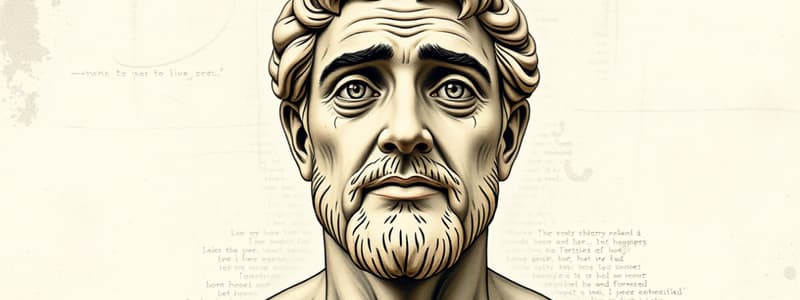Podcast
Questions and Answers
Aristotle believes that self-perception has no impact on true knowledge.
Aristotle believes that self-perception has no impact on true knowledge.
False (B)
Fully functioning persons, according to Rogers, are individuals who do not trust their own feelings.
Fully functioning persons, according to Rogers, are individuals who do not trust their own feelings.
False (B)
Distortion in self-concept is unusual, as most individuals grow up receiving unconditional positive self-regard.
Distortion in self-concept is unusual, as most individuals grow up receiving unconditional positive self-regard.
False (B)
According to Maslow, higher-order needs must be satisfied before lower-order needs.
According to Maslow, higher-order needs must be satisfied before lower-order needs.
Self-actualized people are more conformist and inhibited than the average person.
Self-actualized people are more conformist and inhibited than the average person.
Self-actualized individuals retain their childhood wonder and amazement with the world.
Self-actualized individuals retain their childhood wonder and amazement with the world.
Maslow focused solely on the needs hierarchy and ignored the study of psychological health.
Maslow focused solely on the needs hierarchy and ignored the study of psychological health.
Rogers argues that anxiety arises when experiences align with our self-perceptions.
Rogers argues that anxiety arises when experiences align with our self-perceptions.
Peak experiences are linked to personal growth and increased appreciation of life.
Peak experiences are linked to personal growth and increased appreciation of life.
Unconditional positive self-regard can negatively affect a person's level of happiness.
Unconditional positive self-regard can negatively affect a person's level of happiness.
Flashcards are hidden until you start studying
Study Notes
Self-Concept and Perception
- Self-concept is how individuals perceive themselves, influenced by beliefs and others' opinions, which can be positive or negative.
- Aristotle emphasized the importance of self-awareness as a pathway to true knowledge.
Carl Rogers’ Theory
- Introduced the term “fully functioning persons” to describe individuals who embrace life fully and live in the present moment.
- Emphasized trusting one’s own feelings as essential to personal development.
- Inconsistencies between experiences and self-concept can create anxiety.
- Conditional positive self-regard often distorts self-concept in individuals.
Unconditional Positive Self-Regard
- This concept enhances personal happiness and adjustment by allowing acceptance regardless of one's actions or feelings.
- Individuals thrive in environments where they feel unconditionally accepted by others.
Maslow’s Hierarchy of Needs
- Emphasized that lower-order needs (physical and psychological) must be satisfied before addressing higher-order needs (self-actualization).
- Focused on studying psychologically healthy individuals beyond mere need hierarchy.
Characteristics of Self-Actualized Individuals
- Self-acceptance: Recognizing both strengths and weaknesses without distortion.
- Greater authenticity: Less conformist and more open than others, engaging deeply with their personal identities.
- Awareness of societal rules: They acknowledge social norms but feel empowered to ignore them when necessary.
- Retained childlike wonder: View life as an adventure, maintaining excitement and curiosity.
- Peak experiences: Report profound feelings of unity and power, linked to personal growth.
- After peak experiences, individuals feel more spontaneous, appreciative of life, and less burdened by daily problems.
Studying That Suits You
Use AI to generate personalized quizzes and flashcards to suit your learning preferences.




